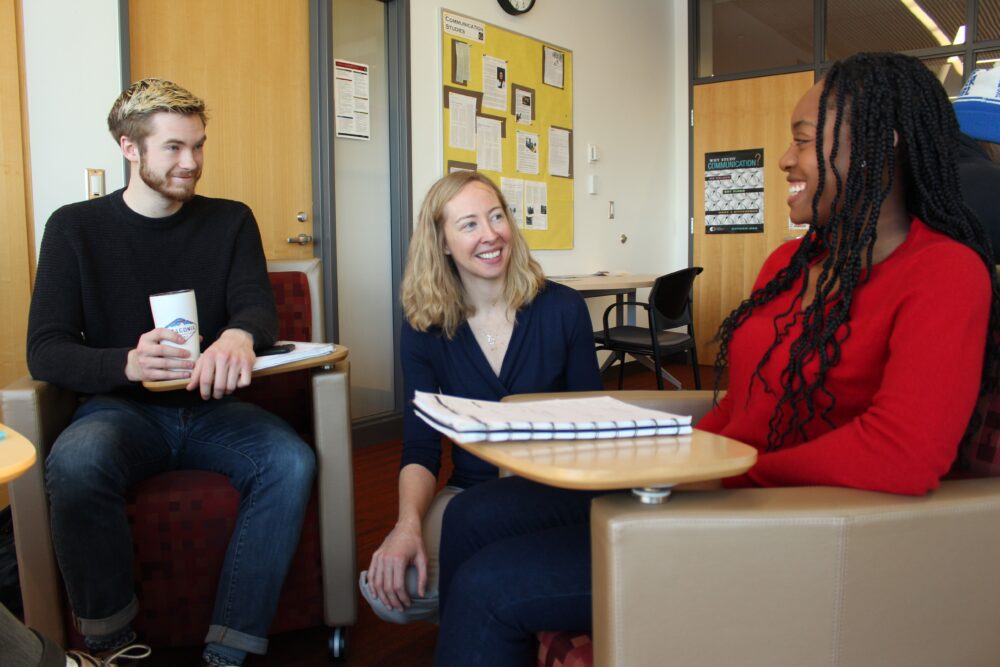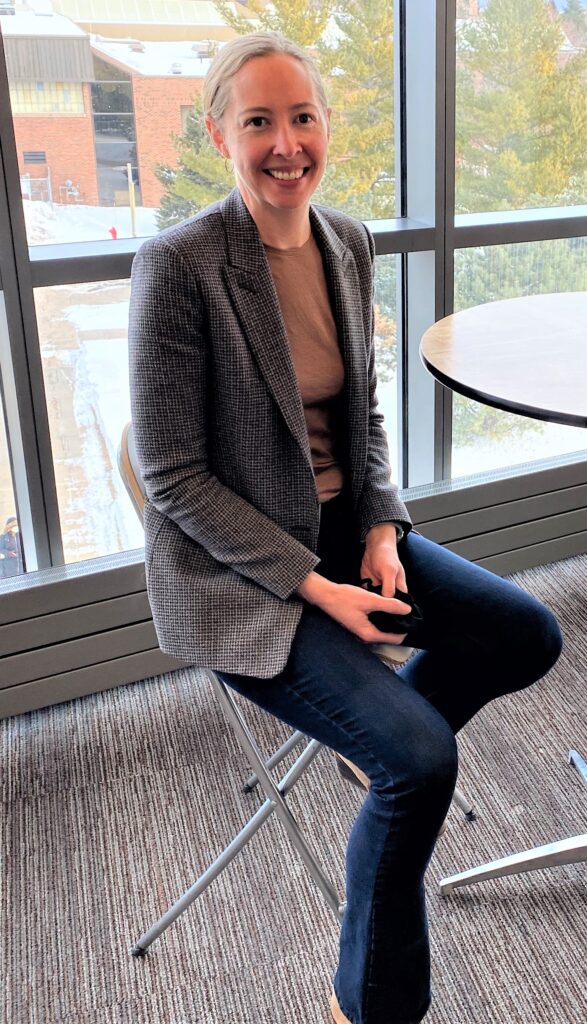Professor Pamela Conners is highlighted this week for teaching our students how to have important conversations that can change the dynamics of how people work together for the better. As athletes who communicate with one another on a daily basis, we know these skills can be game changers on and off the pitch!
 |
| Dr. Pamela Conners meets with Gustavus students last winter. |
“How do we build the capacity to talk to one another about, with, and across our differences?” asks Dr. Pamela K. Conners, associate professor and chair of the Department of Communication Studies at Gustavus Adolphus College.
Conners might seem to have her hands full with such critical issues on the national stage, but she expresses hope with a generation of students who “are hungry for the opportunities to engage.”
“I can’t change the national discourse,” said Conners, who also serves as director for the College’s Public Deliberation & Dialogue (PDD) program. But, she stresses, “It’s critical that we create opportunities to express our own views, talking about our differences and to find points of connection”—especially on issues like racial justice and the ongoing pandemic.
“They are curious about the world,” she says of Gustavus students. But Conners adds that it’s critical to also look locally to contribute to important conversations. “‘Local’ is also family and they can’t always talk comfortably to their family members, their neighbors,” she notes.
“We have to help students build their capacity to engage in conversations about challenges we face,” she says. “This isn’t about winning an argument. There are more than two sides…It’s about trying to learn about and from people with different perspectives.”
Examining both contemporary and historical texts, Conners’ research centers on the arguments and language choices that policymakers and community members use in deliberating about public policy.
 “As a rhetorician, my research and teaching considers the political and social consequences of public discourse. I analyze the ways in which language and symbols are used to influence the way we think, what we believe, and how we respond to each other,” the professor says.
“As a rhetorician, my research and teaching considers the political and social consequences of public discourse. I analyze the ways in which language and symbols are used to influence the way we think, what we believe, and how we respond to each other,” the professor says.That focus on dialogue is a natural fit for Gustavus students, who have “a willingness to listen, a willingness to learn,” according to Conners. And that’s the message she hopes will not only be a critical piece of the PDD program at Gustavus but eventually move into more of a cross-curricular experience for students. For example, Conners is collaborating with chemistry professor Amanda Nienow on a project to expose undergraduate STEM students to deliberative pedagogy, an approach that teaches respectful conversations by “speaking with” rather than “talking to” diverse stakeholders.
There have been plenty of different perspectives over the national political debates and the COVID pandemic. Conners says students, and society as a whole, haven’t always had it easy in developing healthy ways to discuss these important—yet at times controversial—issues.
“It’s troubling,” Conners admits. “And it doesn’t always go well.” Still, she stresses that it is important to “help students learn how to ask critical questions.”
“You have to think about your moments and opportunities. Context and audience should shape when, how, and whether we should engage with others.”
Ratana Chheng ‘22 is taking advantage of those opportunities on campus in Saint Peter as an international student from Siem Reap, Cambodia. The financial economics major is also a PDD program Fellow.
“Gustavus stood out to me because of its reputable sense of community, small and more personalized classes, and its desire to welcome and grow its international student population,” Chheng said.
And she loves the opportunities the program provides for her and others at Gustavus.
“The PDD team emulates a strong sense of community who seeks to understand and appreciate differences in ideas, approaches, and other aspects,” she said, “while using what we learned in class and our experiences to facilitate deliberations and dialogues about sometimes sensitive but always influential and important topics for communities on campus, in town, the county, and beyond.”
And, she notes: “Dr. Conners contributes to the strong, welcoming bond in the PDD team by showing consistent openmindedness and trust in our interactions.”
James Miller ’21 grew up in Northfield and is now a senior biology and geography major and PDD program Fellow. He chose Gustavus “because of the opportunity to learn outside of my major and try out new things along the way.”
“I really value the way that both PDD and Dr. Conners seek to create spaces that are conducive to productive conversation despite differences. How we talk with one another about important issues matters, and I have always appreciated this program’s emphasis on collaborative decision-making.”
Collaborative decision-making also means bringing together diverse voices within a community, according to Conners. And in doing so, it’s important to both invite such diversity and give attention to how questions are framed.
“How you ask the question matters. It determines who is willing to come to the table with you and what you can accomplish together,” Conners says.
Conners says the PDD program philosophy encourages “creating spaces for students to ask questions and make arguments as well as to listen and respond to others. The classroom is a key space to practice and hone those skills.”
For Miller and fellow PDD program Fellows, good communication is central to a liberal arts education and a democracy
For Conners, that message has to affirm some of her efforts.
“The goal isn’t to change everyone’s mind,” Conners says. “The goal is to learn and figure out the way forward together. ”
No comments:
Post a Comment